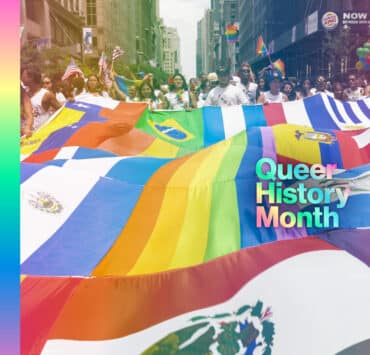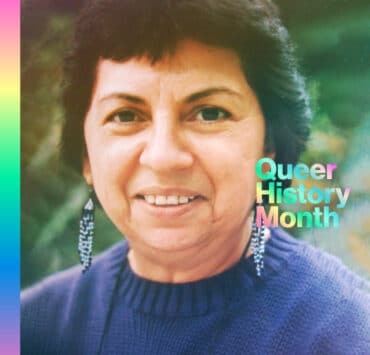|
Getting your Trinity Audio player ready...
|
In recent years, the preservation of queer Latino history has gained significant momentum, as activists, scholars, and archivists recognize the importance of documenting the unique experiences and contributions of LGBTQ+ Latinos. These stories, which intertwine struggles for both racial and queer justice, have historically been overlooked, leaving gaps in our collective understanding of identity and culture.
Fortunately, a growing number of organizations and individuals are working tirelessly to preserve and share this rich legacy. Physical works of the pre-internet era, once subject to damage and loss, are now becoming digitized and accessible thanks to their efforts.
Here are ten initiatives overseen by artists and archivists alike who ensure that queer Latino voices will continue to resonate for future generations.
1. The Latinx History Project
In 2000, the Latinx History Project (then called the Latino GLBT History Project) was founded to recognize the intersectional identities of queer Latinos, who were largely excluded from Latino and LGBTQ+ organizations. Its primary mission is to record and preserve the ongoing contributions made by Latinx members of the LGBTQ+ community and honor their legacies, but it also provides education, fundraising, and advocacy for grassroots organizations.
2. Lambda Legal
While primarily a civil rights organization that advocates for policies giving support and equity to Latino members of the LBGTQ+ community, the Lambda Legal Defense and Education Fund (Lambda Legal) also functions as an archive of its legal cases. In 2023, it partnered with Black and Pink National and Strength in Numbers Consulting Group to publish the Protected & Served? 2022 Report, featuring data and personal stories from queer people who faced challenges such as living with HIV, police misconduct, and discrimination from government agencies.
3. Queer Riot
Founded by queer Latinx activist Antonio D. Santos, Queer Riot is an initiative seeking to make LGBTQ+ history accessible to everyone. It provides workshops on queer liberation and equality for businesses and schools and a paid youth internship designed to educate participants on the history of LGBTQ+ people of color throughout the 20th century.
4. Gerber/Hart Library and Archives
This 1981-founded archival project focuses on Midwestern LGBTQ+ history through a library of books, e-books, and audiovisual media at both its physical location and digitally. It also features online exhibits, including one on queer Latino activist Robert Castillo, who contributed to Chicago’s marriage equality movement and gender identity amendment.
5. Amigas Latinas Forever
The now-defunct Amigas Latinas nonprofit began as a community of queer Latinas in Chicago; its fliers, meeting notes, photography, and other ephemera are now archived in the Gerber/Hart Library. Two queer Latinx artists, Jose Luis Benavides and Amanda Cervantes, began exploring the material in 2020 and debuted an exhibition, “Amigas Latinas Forever,” on their findings and personal reflections in 2023.
6. The Chicago LGBT Hall of Fame
Self-described as a “historic event and exhibit,” the Chicago LGBT Hall of Fame is a nonprofit and custodian of records highlighting contributions by queer activists in the Windy City. It nominates new inductees each year, dating back to its establishment in 1991. Some notable Latinx inductees include Puerto Rican-born trans advocate and performer Lisa Isadora Cruz,community organizer and journalist Emmanuel Garcia,ALMA (Association of Latinos Motivating Action) cofounder Julio Rodriguez, and disabled activist and journalist Michelle Zacarias.
7. UCLA Chicano Studies Research Study (CSRC)
The University of California, Los Angeles’ CSRC Library heads major preservation projects for Latino communities and has curated numerous exhibits focusing on queer Latino identities. Its LGBT and Mujeres Initiative provides education and archives documents that promote pride and inspiration. For Hispanic Heritage Month in 2017, CSRC partnered with Google Arts & Culture to produce the online exhibition, “Joteria: Documenting Queer Latinx in LA.”
8. National Park Service: Places of Latino LGBTQ Gathering Spaces
The National Parks Service is committed to preservation not just through the upkeep of America’s parks but also in publishing stories and articles about diverse history. One such article outlines six historic locations responsible for preserving queer Latino history, complete with descriptions and a visual map. (You can read more about several of them here.) The article’s thesis is that art can serve as an everlasting record of the past, even if the mentioned physical locations someday cease to exist.
9. Adolfo Vega, Founder and Director of El Insulto
Mexico City-based artist Adolfo Vega is a self-taught archivist and the founder of El Insulto, an art collective that recovers and displays erotic materials exploring the history of sexuality in Mexico and its political ramifications. Earlier this month, Vega spoke at New York University with researcher Cynthia Meléndez Montoya for an event titled “The Many Lives of Archives I: Erotic Archives and Queer Records in Latin America.”
10. The Digital Transgender Archive
Based out of Northeastern University, this online archive focuses on preserving documents and materials on transgender history for researchers and academics to utilize. Visitors can browse via map, institution, topic, or collections. There are more than two hundred photos and publications spotlighting Latino members of the LGBTQ community.
—
This article was written with the assistance of AI.

